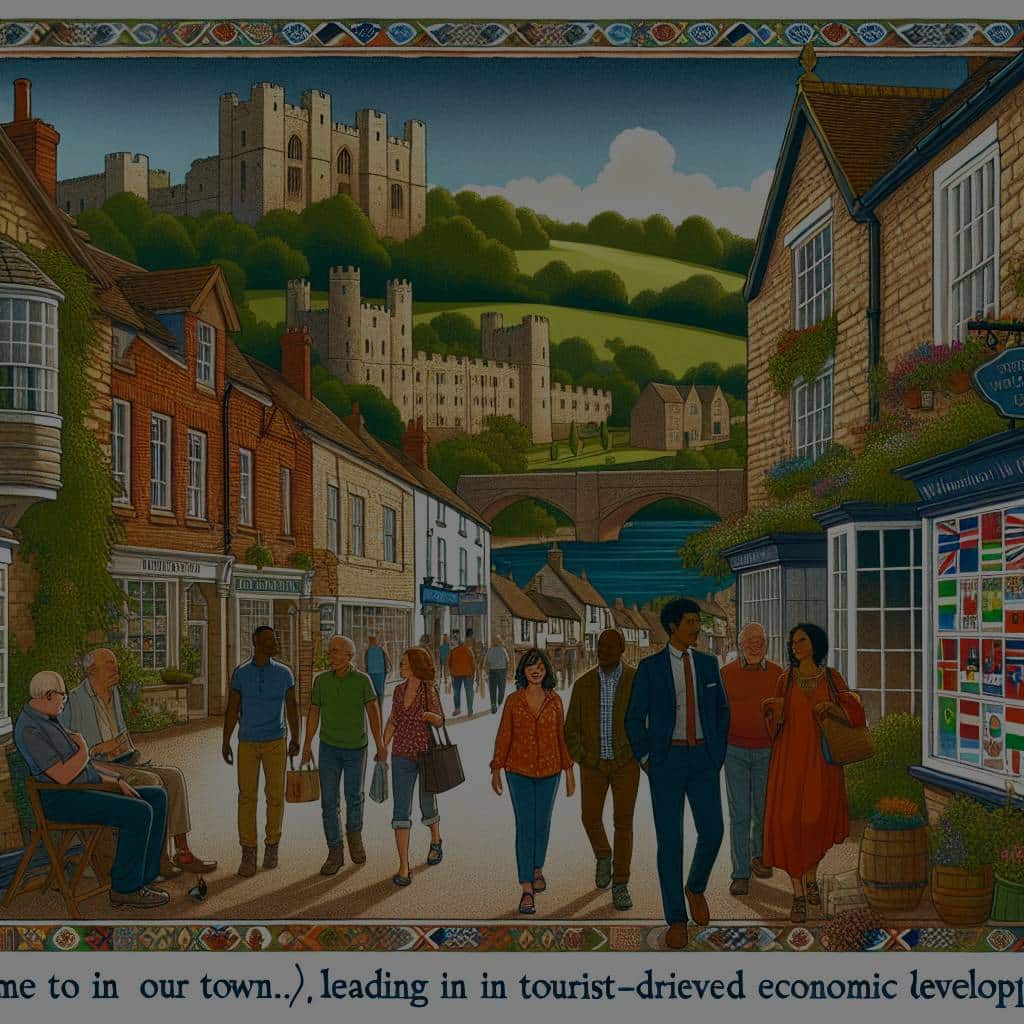How Can UK Small Towns Leverage Tourism for Economic Development?

As we navigate through the wave of the digital age, small towns across the UK are exploring new opportunities to fuel economic development. One of the most promising sectors is tourism. Tourism has the potential to drive economic growth, create jobs, and promote local culture and heritage. However, leveraging this potential requires a strategic approach that considers diverse factors, including infrastructure development, sustainable practices, and the unique cultural identity of each town.
The Impact of Tourism on Local Economy
Tourism has long been recognised as a significant driver of economic growth. It generates income, creates jobs, and stimulates local businesses. For small towns, the benefits of tourism can be even more significant due to the potential for direct interaction between visitors and locals. However, in order to fully leverage these benefits, it’s essential to understand how tourism impacts the local economy and community.
Have you seen this : How Can UK Food Co-ops Benefit from Community-Supported Agriculture (CSA) Models?
Tourism brings in revenue not only from visitor spending on accommodations, food, and entertainment, but also from secondary spending on goods and services that support the tourism industry. This infusion of capital can stimulate various sectors of the local economy, from retail to construction.
Moreover, tourism creates both direct and indirect employment opportunities. Direct employment includes jobs within the tourism industry, such as hotel staff, tour guides, and restaurant workers. Indirect employment, on the other hand, stems from the increased demand for goods and services in the local economy, such as food suppliers, construction workers, and local artisans.
Also read : What Is the Role of Nanotechnology in Enhancing UK Crop Cultivation?
Investing in Infrastructure and Public Services
Tourist destinations need to have the proper infrastructure in place to accommodate visitors and provide a positive experience. This includes a range of facilities and services, such as transportation, accommodation, eateries, and recreational activities. Public services, such as sanitation, safety, and healthcare, are also crucial for ensuring a comfortable and safe environment for visitors.
Investing in infrastructure and public services can yield significant economic benefits. First, it creates jobs during the construction phase and provides ongoing employment opportunities once the facilities are operational. Second, well-planned and well-maintained infrastructure can enhance the appeal of the town as a tourist destination, attracting more visitors and generating more revenue.
Moreover, improvements in infrastructure and public services can also enhance the quality of life for the local community, making the town a more attractive place to live and work. This can help to reverse the trend of urban migration and revitalise small towns.
Promoting Cultural and Rural Tourism
One of the most distinctive assets that small towns have is their unique cultural heritage and rural charm. By promoting cultural and rural tourism, these towns can attract visitors looking for an authentic and serene experience away from the hustle and bustle of urban life.
Cultural tourism involves visiting places and activities that represent the history, culture, and lifestyle of the people in those locations. This can include historical sites, museums, festivals, and traditional crafts. Rural tourism, on the other hand, revolves around activities in rural settings, such as farming, hiking, wildlife watching, and enjoying local cuisine.
Promoting these forms of tourism can not only draw in more visitors, but also help to preserve local culture and traditions. It can also provide opportunities for local residents to participate in the tourism industry, for example by offering home stays, acting as tour guides, or selling local products.
Ensuring Sustainable Tourism Practices
While tourism can bring significant economic benefits, it’s also important to ensure that these benefits are achieved in a sustainable way. This involves balancing the needs of the tourism industry with those of the local community, the environment, and future generations.
Sustainable tourism practices include managing visitor numbers to avoid overcrowding, minimising waste and pollution, and promoting responsible behaviour among visitors. It also involves investing in sustainable infrastructure, such as renewable energy sources and water-saving technologies.
By adopting sustainable tourism practices, small towns can avoid the negative impacts often associated with tourism, such as environmental degradation, cultural erosion, and social inequality. Instead, they can create a form of tourism that benefits everyone – the visitors, the local community, and the environment.
Harnessing Digital Technologies for Tourism Development
In today’s digital age, technology plays a pivotal role in tourism development. It can enhance the visitor experience, promote local attractions, and streamline operations in the tourism industry.
Digital technologies can be used to create virtual tours, mobile apps, and interactive websites that provide information about local attractions and services. They can also be used to facilitate online bookings, provide real-time updates, and gather feedback from visitors.
Furthermore, digital platforms can offer a global reach, allowing small towns to promote their tourism offerings to audiences around the world. They can also enable a more personalised and engaging visitor experience, which can enhance visitor satisfaction and encourage repeat visits.
In conclusion, tourism offers a promising avenue for economic development in UK small towns. By understanding the impacts of tourism, investing in infrastructure and public services, promoting cultural and rural tourism, ensuring sustainable practices, and harnessing digital technologies, these towns can leverage tourism for economic growth and community development.
Enhancing Private Sector and Local Authorities’ Involvement
A key aspect of tourism development lies in the cooperation between local authorities and the private sector. This partnership can be instrumental in designing effective tourism strategies, implementing infrastructure projects, and promoting sustainable practices.
Local authorities, through their regulatory and planning roles, have a major part to play. They can develop comprehensive tourism plans that align with the overall strategy for local development, create the necessary legal and regulatory environment, and provide support for tourism-related businesses and initiatives. They can also ensure that tourism development is inclusive, benefiting the wider community and not just a select few.
The private sector, on the other hand, brings investment, entrepreneurship, and innovation. Private businesses, ranging from hotels and restaurants to travel agencies and tour operators, are the key players in the tourism sector. They provide the goods and services that cater to tourists, create jobs, and contribute to the local economy.
However, the role of the private sector extends beyond their business operations. They can also contribute to tourism development by investing in local infrastructure, adopting sustainable practices, and participating in community initiatives. For example, a hotel can invest in renewable energy sources, implement water-saving technologies, and support local artisans by selling their products.
By working together, the private sector and local authorities can create a symbiotic relationship that enhances the economic and social benefits of tourism, while also ensuring its long-term sustainability.
Improving Quality of Life for Local Communities
As small towns leverage tourism for economic development, it’s also crucial to consider the impact on the quality of life for local communities. Tourism should not only spur economic growth but also enhance the wellbeing of local residents.
Firstly, the revenue generated from tourism can be reinvested into local services and amenities, such as schools, healthcare, and public parks. This not only benefits the visitors but also improves the everyday lives of the residents.
Secondly, as mentioned earlier, tourism can create a wide range of employment opportunities. However, it’s important to ensure that these jobs are well-paid and secure, contributing to the financial stability of the local community.
Lastly, tourism can support the preservation of local culture and heritage. This not only attracts tourists but also strengthens the cultural identity of the local community, instilling pride and unity among residents.
However, it’s crucial to manage tourism development in a way that respects the rights and needs of the local community. This includes avoiding overcrowding, minimising noise and disruption, and preventing the gentrification of local neighbourhoods.
By keeping the interests of the local community at heart, small towns can create a model of tourism that’s not only economically beneficial but also socially equitable and culturally enriching.
Conclusion
Tourism presents an exciting opportunity for economic development in UK small towns. However, to fully harness this potential, it’s crucial to adopt a strategic approach that takes into account the local economy, infrastructure, cultural heritage, sustainable practices, digital technologies, and the needs and wellbeing of the local community.
By doing so, small towns can create a vibrant and sustainable tourism sector that drives economic growth, creates jobs, preserves local culture and heritage, enhances the quality of life for residents, and attracts visitors from around the world.
Looking forward, as these small towns continue to explore and innovate in the realm of tourism, they will not only contribute to their own prosperity but also play a crucial role in the broader economic development of the UK. It’s a journey that holds much promise and one that we should all watch with anticipation and support.
